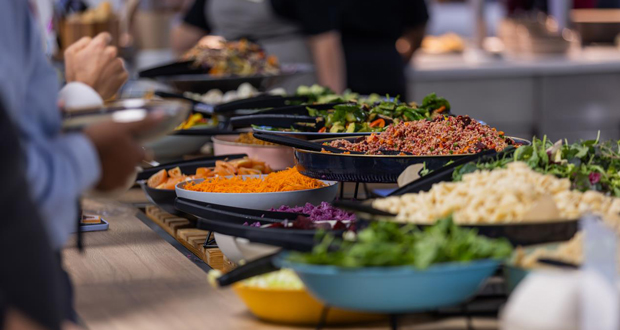The results of Sodexo UK and Ireland’s second annual Sustainable Food Barometer reveal UK consumers want nutritious, sustainable meals that protect the planet without compromising on taste or affordability.
This says Sodexo, presents a significant opportunity for foodservice providers, manufacturers, and retailers to take the lead in making sustainable eating both accessible and appealing.
The three key takeaways from the research:
1) Consumers still value sustainable food, despite challenges
- 68 per cent of consumers still view sustainable food positively, which is similar to last year’s 69 per cent.
- Price remains a concern but has slightly decreased since last year, with 31 per cent prioritising affordability when buying food compared to 36 per cent the previous year.
- Only four per cent cited environmental concerns as their primary consideration, consistent with last year’s findings.
- Sustainable food is seen as healthier and better for the planet, with 35 per cent associating it with better nutrition and 55 per cent linking it to protecting the environment.
What does this mean? In a time when food prices are high and social responsibility matters, UK consumers feel a mix of emotions about sustainable food. They’re mostly positive but still have some doubts. It’s crucial that foodservice providers, manufacturers, and retailers show them that sustainable food is healthy, good for the planet. Without greater uptake from consumers, meeting net zero targets will be a challenge.
2) Price, taste, and health are deal-breakers for most consumers
- This year’s Barometer identifies three main consumer profiles when it comes to sustainable food: the ‘Committed’ (34 per cent), those who choose sustainable food when available; the ‘Undecided’ (45 per cent), those who hesitate to choose sustainable food products; and the ‘Distant’ (21 per cent), those who have no intention of eating more sustainable products.
- Across all three profiles, the same three priorities stand out: price, taste, and nutrition.
- After price, the top considerations for UK consumers when purchasing food are taste (69 per cent), health factors such as nutritional value (50 per cent) and ingredients (44 per cent).
- The risk of losing taste and flavour is the main barrier for consumers. This is true of 49 per cent of respondents who are ‘Committed’ to sustainable food and 74 per cent of the ‘Undecided’. Three-quarters of those identified as ‘Distant’ are not willing to consume a sustainable product if it is less tasty than a regular product.
- The price barrier is also significant. While 63 per cent of those in the ‘Committed’ group are willing to choose a sustainable product even if it is more expensive, this drops significantly to just 36 per cent of the ‘Undecided’ and 33 per cent of ‘Distant’ consumers.
What does this mean? UK consumers care about sustainability, but only if it aligns with their expectations for price, taste, and nutrition. Offering nutritious, sustainable food not only meets these demands but also supports healthier lifestyles and a greener planet. Foodservice providers, manufacturers and retailers must offer sustainable meals that are delicious, nutritious, and comparably priced to traditional options to drive meaningful change.
3) Food service providers play a big role in driving change
- Consumers see foodservice providers as important players in encouraging sustainable eating (26 per cent), third only to farmers (39 per cent) and agri-food stakeholders (30 per cent).
- Consumers expect foodservice providers to prioritise the following: reduce food waste (48 per cent); prioritise local sourcing (39 per cent); use environmentally friendly ingredients (37 per cent); transparency in labelling and certification (34 per cent); offer creative, delicious recipes (32 per cent); and educate them about sustainable eating (31 per cent).
- On the matter of low carbon meals, there is a gap between consumer expectations and their current experience: 41 per cent expect restaurants and food-to-go outlets to offer clear carbon labelling, yet 53 per cent of respondents said they did not recall seeing such labels; While 36 per cent are willing to pay a premium for low-carbon meals, better communication and clearer labelling are essential to encourage adoption.
What does this mean? Foodservice providers must lead by example—not only by offering affordable, delicious, and sustainable meals but also by effectively communicating their value to consumers through clear labelling and taking action on issues such as reducing food waste and prioritising sustainable, locally sourced ingredients.
Charles Abraham, Food Director at Sodexo UK & Ireland said: “This research gives us valuable insight into what consumers really want when it comes to sustainable food. They care about the planet but don’t want to compromise on price, taste, or nutrition—and nor should they have to. At Sodexo, we are committed to making sustainable eating the easy choice. We’re committed to serving 70 per cent low-carbon meals by 2030 and cutting our food waste in half by August 2025. To make a difference, we ensure our sustainable meals are affordable, tasty, and accessible for everyone.”
Staying ahead in maintenance management means being informed about the latest trends and strategies. Global worktech company, Eptura, has published a new eBook which identifies the major trends impacting maintenance priorities and budgets.
The insights collected from leaders across industries provide advice for facilities managers and maintenance professionals on how to be more agile when it comes to capital planning and operations, and the importance of having the right data to guide you.
To explore Eptura’s eBook ‘5 Maintenance Priorities‘, a crucial resource for understanding these trends, click here to download your free copy.





